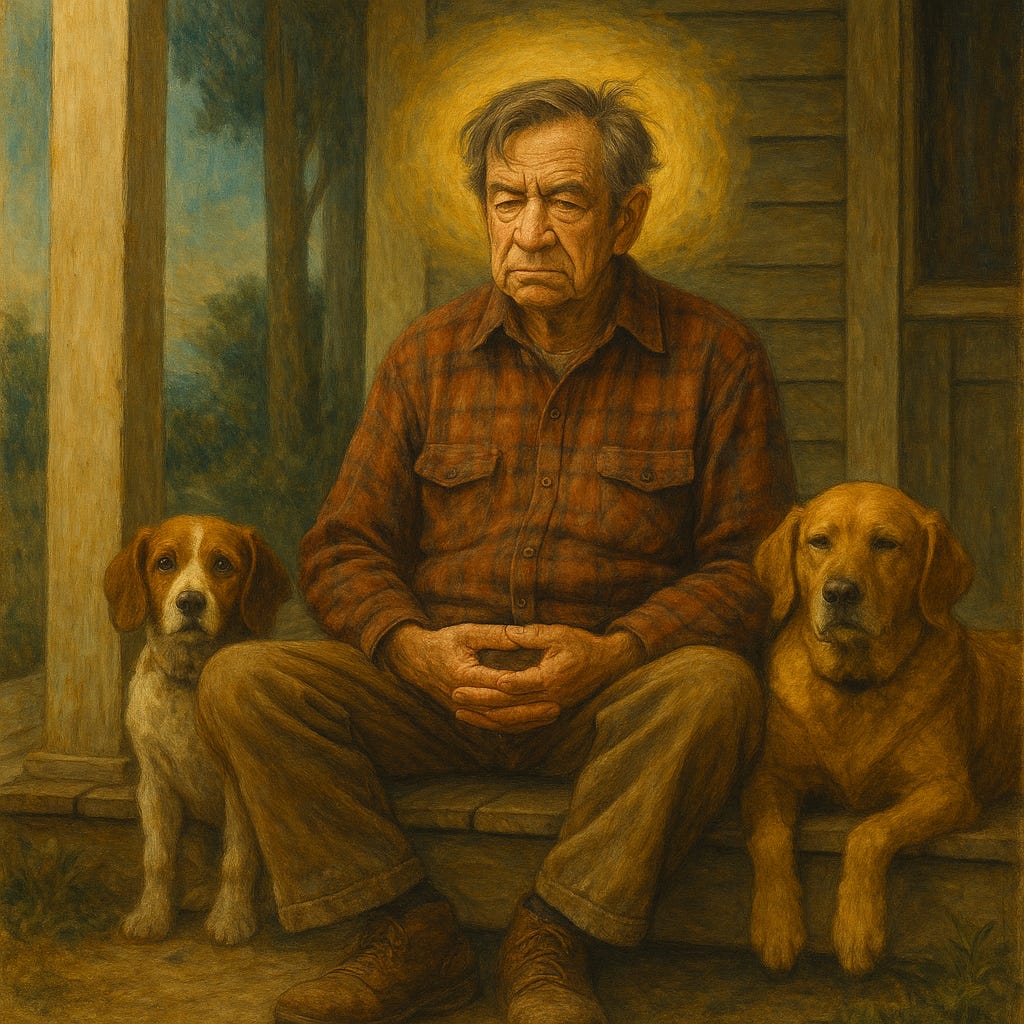The Terms of Clarity - Prajna?
Reflections from a Mind That's Done Pretending and mining deeper meaning.
It’s been an interesting journey the last several months. Might seem like a broken record, but the pattern is so much clearer now. Several of my recent posts have circled around one theme: being real. Not performatively real — but unflinchingly, painfully, deliberately real.
There’s a kind of anger that doesn’t scream anymore. It doesn’t break plates or storm out the front door. It simply... steps back. It watches. It observes the madness and whispers, "This isn’t mine."
That’s where I am. Where we are. Me and a few others who still question, still notice, still see the patterns repeating. We aren’t loud anymore. We’re deliberate. Maybe even done.
Human Nature Isn't the Bug. It's the Code.
Let’s stop pretending we’re evolving. We’re not. We’re recycling the same fear, power, and tribal rituals with better costumes and smarter tech. Same play, just flashier stage design. I urge you to take a step back — WAY back — and look through a lens that might be unsettling or even impossible for most. And don’t take offense when I say this, but the story we’re all living through? It’s not new. It’s a rerun with higher resolution — case in point:
The Israeli-Palestinian conflict. Iran. Netanyahu. The U.S. backing Israel with predictable moral fervor. Are we supposed to believe this is new? Are we supposed to pretend it's not just another layer of the same survival-based theater humans have played for thousands of years?
This isn't about politics — it's about biology. For over 2,000 years, the same groups, the same faiths, the same flags have circled each other in a slow-burning loop of vengeance, fear, retaliation, and superiority. Romans and Jews. Crusaders and Muslims. Nazis and minorities. Empires collapse, new ones rise — but always on the back of the same ancient instincts: divide, dominate, defend.
Patterns of power, influence, defensiveness, and conflict keep playing out, again and again. Across centuries, different names and flags emerge, but the script remains unchanged. It's not always a cultural flaw — maybe it's just human instinct. An ancient compulsion to divide, to dominate, to protect our tribe and justify it with stories of right and wrong.
Perhaps Graham Hancock is onto something with his "ancient apocalypse" thesis. Maybe the controversy isn't just in what he’s proposing — but in what it implies: that we’ve all done this before. Long before. That civilization, power, collapse, and amnesia are a cycle far older than our textbooks allow. That what feels like forward motion might just be another lap around a very old track.
Society tends to explain these patterns away: "Oh, it's about historical context," or "That's just extremists," or "It’s different this time." But we’ve seen this show before. From Rome to Jerusalem, from crusades to conquests, from revolutions to modern geopolitics. Every time someone says, "Never again," the clock resets.
So why do we keep pretending peace and tolerance alone can fix it — when nature doesn’t seem built that way?
That’s not hate. That’s disillusionment mixed with truth-seeking.
We frame modern wars with hashtags and broadcasts, but they're still ancient battles dressed in digital robes. And when you pull back far enough, you see it: ideology is the new religion, and everyone’s still worshipping their version of control.
Seeing the Pattern Is a Curse and a Gift
Ask too many questions and suddenly you're labeled the problem. The one who's "grumpy" or "intense" or "difficult."
But let’s be honest. It’s not anger — it’s clarity. It’s not withdrawal — it’s boundary. It’s not bitterness — it’s exhaustion.
I used to care more. About justice, fairness, progress. But these days, I'm more interested in truth than tribal victories.
And truth? It doesn’t wear a jersey. It doesn’t need to be popular. It doesn’t care about your trauma points or hashtags. It just waits — until you’re tired enough to see it.
Because the world runs on illusions. Stories, flags, identities, political theater, emotional narratives — all designed to keep the machine humming. The moment you start seeing past it, the entire framework starts to glitch.
If everyone saw clearly beneath that illusion, everything we rely on to maintain order would begin to fall apart. Propaganda would lose power. Group identity would weaken. The “us vs. them” game would collapse. And those clinging to authority or moral superiority would feel the ground go soft beneath their feet.
In one sense, that would be beautiful. In another, completely destabilizing. It's no wonder that throughout history, truth-tellers have been exiled, silenced, mocked, or killed. Because real awareness — stripped of loyalty and illusion — doesn’t serve systems built on obedience. It threatens them.
This isn't about being better or more enlightened. It’s about recognizing what happens when the veil slips — and how uncomfortable truth becomes when it no longer benefits the narrative. It’s about what we choose to do with that discomfort.
Because discomfort alone doesn’t equal awakening.
But here's the thing most people miss:
Discomfort Alone Doesn’t Equal Awakening
Some people are uncomfortable with reality, but instead of waking up, they:
Collapse inward
Double down on denial
Escape into fantasy, blame, or substance
Adopt extremist ideologies to soothe the chaos
They’re not on the edge of revelation — they’re spiraling into reaction, not reflection.
So yes: discomfort can lead to transformation, but it doesn’t guarantee it.
In fact, in many cases, discomfort leads to radical entrenchment, not awareness.
The Hermit Vision
So I started building the dream: A dirt road. A house no one delivers to. (Funny — my mind goes to The 'Burbs, but even I have standards.) Dogs. Cats. No Jehovah's Witnesses. No Girl Scout cookies. A place where silence isn’t awkward — it’s sacred in a way that needs no explanation. For imagery, think of the brothers in the movie Secondhand Lions sitting on the porch, or Grumpy Old Men set in their stubborn ways — not because they're cranky, but because hell, they've earned it.
Where the only things that demand my time are:
The crackle of firewood.
The smell of coffee, with pie in the morning.
An amazing glass of Whiskey on the porch.
The heartbeat of an old dog who doesn’t care about politics, just cares about his ball and his human.
I want to go where performance dies. Where reputation isn’t currency. Where I can stop pretending I’m not already free.
But let’s not be naive: Humans aren’t meant to live alone forever. We are wired for connection. That’s the paradox:
I want solitude. But I don’t want loneliness.
So maybe, just maybe, there’s someone else out there — a friend, a partner, a co-conspirator — who doesn’t flinch at the truth either. Someone who sees the loop. Who gets the joke. Who’s ready to split firewood, curse the headlines, and argue over the meaning of everything between coffee and bourbon.
Like a real-life version of Grumpy Old Men, but with better music and dogs that don’t die in the third act or a fight over a female.
The Pattern Is the Prison
You know what really breaks a person? Not pain. Not even loss.
It’s the pattern. The same script, with new actors and the same ending. History dressed in modern clothes, reciting the same broken logic and calling it "progress" because the font has changed.
We keep doing the same damn thing — over and over — expecting a different result. And even that phrase has become cliche. That's how deep the madness runs: even calling it madness feels routine now. Because the truth is, people love insanity when it feels familiar. They choose the loop because it's predictable.
We blame groups, cultures, faiths. We pretend some are better, some more enlightened. But it’s all human nature on repeat — need, fear, control, justification, war, denial — recycled endlessly through belief systems and broken institutions.
And when you finally see that—when the illusion breaks—you have two choices:
Join a new tribe and keep pretending.
Or walk away.
I'm learning to walk.
But there’s another layer to this walk — one the ancient sages knew well. In Buddhist and Sanskrit traditions, there’s a word: Prajna (pronounced PRAHJ-nah) — often generally known as “wisdom” (though even that feels inadequate), but it’s more than that. It’s a kind of awareness that sears — the kind that unsettles before it liberates. It’s clarity that strips you of comfort. It's the quiet knowing that once something becomes clear, it never becomes unclear again.
The path to that kind of clarity — to Prajna — is brutal. Enlightenment, if it exists at all, is elusive. And yet... why does it feel so good when one small thing suddenly makes sense? Even when that insight opens a whole new universe of heavier, sharper questions?
That's the paradox. The curse of a finite life with a mind full of infinite questions.
We chase truth like a moth to flame — knowing it might singe, but still craving the heat. Because even if we can’t reach answers, we can reach awareness. And that, somehow, is enough to keep going.
Learning to Walk in a World That Won't Slow Down
Maybe that’s what Prajna really is — not a destination, but a state of becoming. A state where even in disillusionment, you feel oddly awake. Where you start to trust that the fire in your gut isn’t rage — it’s recognition.
If you’ve read this far, then maybe you’re like me. Maybe you’ve spent years wondering why you see it and others don’t. Maybe you’ve tried to talk about it and been shut down. Laughed at. Ghosted. Diagnosed.
But hear me:
You’re not broken. You’re not bitter. You’re not antisocial. You’re just done.
And in a world addicted to noise, being quiet isn’t a weakness. It’s a revolution.
So I offer you this:
The Terms of Clarity:
Tell the truth, even when it ruins the mood (Still practicing this one).
Let the noise pass — it’s not your job to entertain the crowd.
If you can’t change it, and it fails the “so what?” test — drop it. Keep walking.
Keep your world small, but your mind wide open.
Guard your inner stability like it’s the last honest thing you own — deliberate, non-negotiable, and without apology.
And if someone stumbles down that dirt road and understands? Pour them a mug, say nothing, and let the dogs decide.
Maybe nothing changes. Maybe the cycle continues. But at least we’re not pretending anymore.
That’s not giving up. That’s waking up.
And maybe, just perhaps, that’s the start of something real.
Because surface-level is for suckers. And if you've made it here — through the noise, through the patterns, through your own unraveling — you're mining too.





